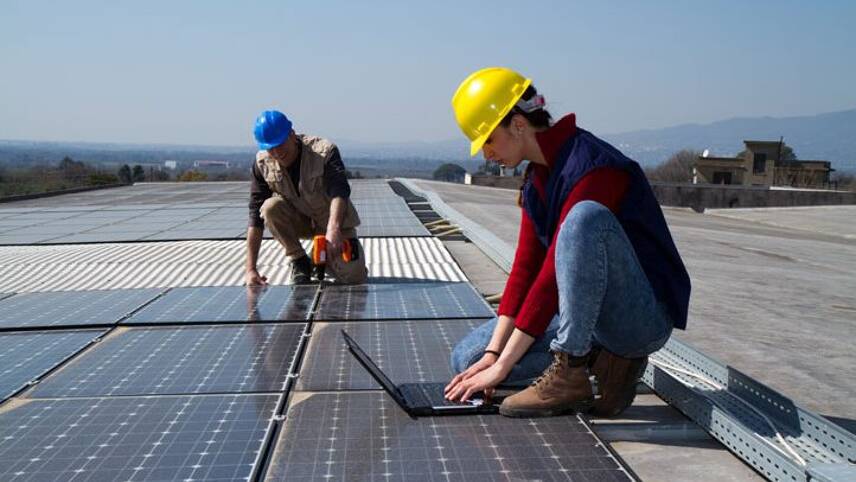Register for free and continue reading
Join our growing army of changemakers and get unlimited access to our premium content

Climate ambitions are continuing to ramp up with governments and businesses announcing new commitments that will bring the UK closer to a green economic recovery.
Behind the intent and sentiment to tackle the climate crisis is the need for a strong workforce that can turn plans and strategies into a net-zero reality. A workforce made up of the new skills, qualities and capabilities needed to deliver and able to overcome challenges on the road to a clean energy future. This will require harnessing diversity of thought, perspective and experiences.
Most conversations around diversity are rarely linked to the climate agenda but with the challenge ahead, it couldn’t be more pertinent. We know diversity brings new ideas, different ways of working and can help drive innovation. We absolutely need all of this – it will be key to developing green technologies and solutions in the coming years and decades. However, many net-zero roles still lack diverse talent with some, such as engineering, being heavily male dominated with women accounting for only 12% of UK engineers – there is a significant gender imbalance that needs to be addressed if we are to achieve climate targets.
Progress won’t happen overnight but there are actions businesses can put in place to attract, retain and progress female talent, helping them to achieve their full potential as part of a workforce tackling climate change. These include leveraging the insights and networks of external organisations; getting forensic with your talent programmes; and proactively celebrating and promoting role models to help inspire the next generation of young female talent.
Engage with external organisations – we need a collective effort
Tackling gender imbalance isn’t something that needs to be done by a business in isolation. So much of our inclusion and diversity learning at National Grid has come from working with other companies that might have overcome their own diversity challenges or are in the process of understanding what they can do to address issues in their own workforce.
Working with external partners such as POWERful Women and Energy Leaders Coalition can help break down barriers and share best practice between businesses. Addressing this issue in the long-term requires a collective effort across different sectors and industries, and leveraging knowledge and insights from other organisations can help achieve meaningful action.
Celebrate and promote female role models – you can’t be what you can’t see
With women representing only 12% of the UK’s engineers, it’s critical that we take steps to highlight role models who can help inspire the next generation of young women. From schoolgirls taking an interest in maths or science, to students passionate about tackling the climate crisis to women who want to play their part in net-zero – celebrating female role models can help them believe that the energy sector has a place for them.
At National Grid, for example, our Female Engineer of the Year awards recognises outstanding female talent and those individuals who have contributed to our engineering community. The awards are part of our activity for International Women in Engineering Day (23 June) to inspire colleagues, help women link up with other female engineers and create a supportive network. We’re also introducing the male allies award which celebrates those that have been supporting efforts to create an equal and diverse workforce – making the conversation and tackling the issue inclusive across the business.
Collaborating with the Women’s Engineering Society is another great way to recognise and celebrate female role models, harnessing the network of a wider external organisation to reach women across different sectors and industries.
Challenge current talent processes and programmes – are they fit for purpose and inclusive?
Sometimes talent processes and programmes need a refresh or rethink, especially if they’ve been in place for a number of years. Businesses need to ask themselves, do these initiatives consider the different facets of diverse characteristics, or do they still look at diversity through a single lens? If we look at female engineers, for example, there are a number of diverse groups within gender – for example, are we thinking about women from different racial and ethnic backgrounds, their social background, age, caring responsibilities and more?
Are programmes that aim to accelerate progression of women still achieving what they set out to? Or do they need to be updated to incorporate new roles that are emerging in climate and sustainability or to reflect different career trajectories as new net-zero jobs are created? As we enter a new era for tackling climate change, and as the need for female talent grows, now is the time to review and reassess talent processes to ensure that from talent attraction, through to progression and retention, they are set up to achieve a more diverse workforce.
Women have a key role to play in tackling climate change
We know that women are motivated to help find the solutions that will deliver a greener future. According to our research, 83% of women saying it’s important to play a role in the UK’s journey to net zero.
The pandemic has created new challenges for many women, which have been exacerbated by different circumstances from homeschooling to the burden of domestic work. As businesses emerge from Covid-19 and the country focuses on a green recovery and building back better, more needs to be done to support women to succeed in net-zero roles.
And that’s not just because it’s the right thing to do, but because there is a real need to recruit diverse people to the net-zero workforce who can help overcome the challenge climate change poses to businesses, sectors, the country and the world.



Please login or Register to leave a comment.